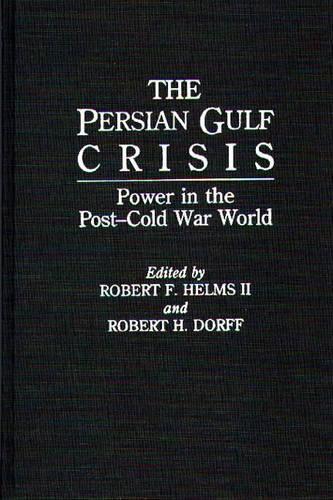
The Persian Gulf Crisis: Power in the Post-Cold War World
(Hardback)
Publishing Details
The Persian Gulf Crisis: Power in the Post-Cold War World
By (Author) Robert H. Dorff
By (author) Robert Helms
Bloomsbury Publishing PLC
Praeger Publishers Inc
30th November 1992
United States
Classifications
Tertiary Education
Non Fiction
International relations
Middle Eastern history
327.09536
Physical Properties
Hardback
216
Description
This text examines the implications of the Persian Gulf crisis in order to enhance our understanding of the post-Cold War international system. More than just another analysis of the Iraqi invasion of Kuwait and the subsequent war, the book looks at the more general aspects of the use of force (political, economic, and military) evident in the Gulf crisis and what they can tell us about the emerging post-Cold War system. Contributors were selected on the basis of their ability to address specific questions and policy issues, and to cast their analyses at a broadly theoretical level. Each chapter looks at a different aspect of conflict in the international system and how that relates to the Persian Gulf crisis. Several aspects of the crisis and the new international system are examined such as the role of the United Nations, the utility of economic sanctions, the historical origin of the crisis itself, the potential sources of conflict and responses to it, and the changing nature of the use of military force. To the extent that the lessons found contradict the "common wisdoms" that emerged in the immediate aftermath of the war, many of the chapters challenge the trend to find sweeping generalizations in the Gulf crisis that bear directly on international relations in the 1990s and beyond. Civilian and military policymakers, as well as students and teachers of international studies, will find this book of interest.
Reviews
The essays in this book on the Persian Gulf Crisis and the shift in power in the post-Cold War are timely and useful commentaries on the changing search for security following the Iraq invasion of Kuwait.-The Friday Review of Defense Literature
"The essays in this book on the Persian Gulf Crisis and the shift in power in the post-Cold War are timely and useful commentaries on the changing search for security following the Iraq invasion of Kuwait."-The Friday Review of Defense Literature
Author Bio
ROBERT F. HELMS, II is Program Director, Military Issues and Studies, Center for Social Research and Policy Analysis, at the Research Triangle Institute at Research Triangle Park, North Carolina. ROBERT H. DORFF is Associate Professor in the Department of Political Science and Public Administration at North Carolina State University.
